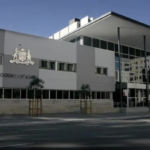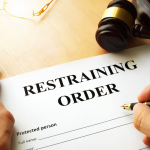What Are the Conditions of Apprehended Violence Orders in New South Wales?

Apprehended violence orders in New South Wales come in two broad categories – apprehended domestic violence orders (ADVOs) which are intended to protect a person from someone with which they have or had a domestic relationship (such as a current or former partner, family member or a person with which they have a relationship of care) and apprehended personal violence orders (APVOs), which apply to anyone else including neighbours, work colleagues, friends and associates.
Provisional, interim and final AVOs
Applications for these orders proceed in stages.
Some commence with a provisional AVO (sometimes called a telephone interim order) which police may apply for before a case comes before a court to urgently provide protection for a person they feel needs it.
The next stage is an interim AVO, whereby the court makes the order as the case proceeds through the court system.
And lastly, a final AVO is – as the name suggests – a final AVO made at the finalisation of proceedings, whether with the consent of the defendant (this consent is usually given without having to admit any wrongdoing) or otherwise by order of the court (eg after a plea of guilty to an associated criminal charge or an unsuccessful defended AVO hearing.
Private versus police AVOs
To complicate things further, applications for AVOs can either be made privately by a person who believes they are in need of protection, or by a police officer on behalf of that person.
Applications made by police are often accompanied by associated criminal charges – such as common assault or stalk or intimidate charges – which encompass the same alleged conduct as that which forms the basis of the AVO application.
Conditions of AVOs
Regardless of the category of AVO or the person making the application, the order will come with a number of conditions which can sometimes seem uncertain and confusing.
Here’s a summary of the conditions that attach to AVOs in New South Wales and an explanation of what they mean.
Mandatory Conditions of AVOs
Every ADVO/APVO includes condition 1, which is the mandatory or standard condition and is referred to as ‘Orders about behaviour’:
Condition 1
1. The defendant must not do any of the following to the protected person or anyone the protected person has a domestic relationship with:
a) assault or threaten them,
b) stalk, harass or intimidate them, or
c) intentionally or recklessly destroy or damage any property or harm an animal that belongs to or is in the possession of them.
This condition is intended to emphasise and reinforce existing laws against the listed conduct.
To put it another way, each of the listed conduct can amount to a crime in and of itself, but listing these proscribed forms of conduct within apprehended violence orders is intended to make it crystal clear the defendant is not to engage in such actions; doing so can see the defendant not only facing charges for the acts but also the separate and additional offence of contravening an apprehended violence order which is an offence under section 14 of the Crimes (Domestic and Personal) Violence Act 2007 that carries a maximum penalty of 2 years in prison.
Additional Conditions
Depending on the circumstances that lead to the AVO application, additional conditions can be sought to protect the named individual/s.
The additional orders can be further divided as orders relating to:
- Contact with others,
- Family law and parenting,
- Movement, and
- Firearms.
The additional conditions that can be included in an AVO are:
Orders relating to contact
Condition 2:
2. You must not approach the protected person or contact them in any way, unless the contact is through a lawyer.
This condition prevents any contact (including through social media, family and friends, and even using the description in bank transfers to send a message) unless the contact is through a lawyer.
Condition 3:
3. You must not approach:
a) the school or any other place the protected person might go to for study,
b) any place they might go to for childcare, or
c) any other place listed here___.
This condition places a restriction on where the defendant can specifically go.
Condition 4:
4. You must not approach or be in the company of the protected person for at least 12 hours after drinking alcohol or taking illicit drugs.
This condition places a restriction on being near the protected person after drinking alcohol or taking illicit drugs. It does not matter if you do not feel drunk or affected.
Condition 5:
5. You must not try to find the protected person except as ordered by a court.
This condition places a restriction and prevents the defendant from looking for the protected person. This includes asking family and friends.
Orders relating to family law and parenting
Condition 6:
6. You must not approach the protected person or contact them in any way, unless the contact is:
a) through a lawyer, or
b) to attend accredited or court-approved counselling, mediation and/or conciliation, or
c) as ordered by this or another court about contact with child/ren, or
d) as agreed in writing between you and the parent(s) about contact with child/ren, or
e) as agreed in writing between you and the parent(s) and the person with parental responsibility for the child/ren about contact with the child/ren.
This condition gives some flexibility with how and why the defendant can contact the protected person when there are children involved.
Orders retraining movement
Condition 7:
7. You must not live at:
a) the same address as the protected person, or
b) any place listed here ___.
This condition places a restriction and prevents the defendant from living with the protected person, or at a particular address.
Condition 8:
8. You must not go into:
a) any place where the protected person lives, or
b) any place where they work, or
c) any place listed here___ .
This condition places a restriction and prevents the defendant from entering the protected person’s home, work or another specific address.
Condition 9:
9. You must not go within ___ metres of:
a) any place where the protected person lives, or
b) any place where they work, or
c) any place listed here___.
This condition places a restriction and prevents the defendant from being a specified distance to the protected person’s home, work or other specific address. This includes passing through the area, for example, driving on the street even if it is for an unrelated reason.
Order relating to firearms and prohibited weapons
Condition 10:
10. You must not possess any firearms or prohibited weapons.
This condition places a restriction and prevents the defendant from owning any firearm or prohibited weapon.
A list of prohibited weapons in New South Wales is contained in Schedule 1 of the Weapons Prohibition Act 1998.
Consequences of a breach
It is vital understand and comply with the conditions even if you do not agree with the grounds of the application, as failing to adhere with the orders can amount to contravening an apprehended order, which as stated above is an offence under section 14 of the Crimes (Domestic and Personal) Violence Act 2007 that carries a maximum penalty of 2 years in prison.
Applicant bears the onus of proof
It is important to be aware that the person who makes the application for an apprehended violence bears the legal onus on proving ‘on the balance of probabilities’ (in other words, that it is more likely than not) that the making of the AVO is warranted under the law.
If the case proceeds to a defendant hearing and the applicant fails to discharge that legal onus, the application will be unsuccessful and no orders will be made against you.
AVOs can be negotiated
It is also important to bear in mind that the additional conditions of AVO as well as the duration of final AVOs can be negotiated; in fact, these conditions – whether at the interim or final stage of proceedings – can often be removed by negotiation or in court altogether.
In some cases, defendants will accept AVOs ‘without admissions’ (in other words, without admitting any wrongdoing) for a short period of time on standard conditions only.
In other cases, especially when it comes to privately brought AVOs, it is often possible to negotiate ‘undertakings to the court’; in other words, a promise not to engage in certain conduct.
These undertakings do not have legal effect but may be brought up if there are any future incidents.
Not a criminal conviction
There is a common misunderstanding that having an AVO against you means you have a criminal conviction. It does not.
An AVO is not classified as a criminal case, and getting an AVO against will not result in a criminal conviction. That said, you should be aware having a current AVO or even a past one can prevent you from obtaining certain licences and may also make it more difficult to secure certain types of employment, especially those which require a full background report.
Going to court for an AVO?
If an application for an AVO has been made against you, call Sydney Criminal Lawyers 24/7 to arrange a free consultation with a specialist defence lawyer with vast experience and success in defending and winning AVO cases, whether or not they are accompanied by criminal charges.






